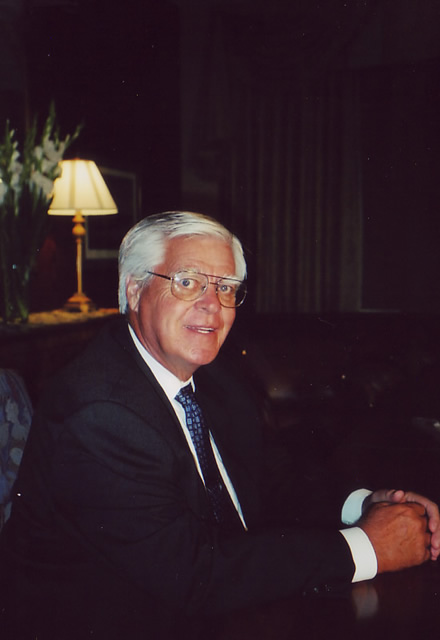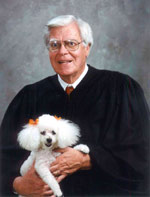|
Help About Related Share Your Story General Mall
Food Court Retail Entertainment Management Souvenirs Related Links
|
WyethChandler
Memphis Mayor Wyeth ChandlerFrom The Memphis Flyer - Jackson Baker - 2004Memphis' former chief executive, laid to rest on Monday, was something of an Everyman's man. by Jackson Baker Wyeth Chandler, whose tenure as chief executive of Memphis spanned the old age of paternalistic control by a social elite and the new one of democratized urban sprawl, partook of both worlds himself.  When Chandler, who died last week at the age of 74 after suffering a heart attack, was eulogized on Monday at Bellevue Baptist Church, he was referred to as an "aristocrat" by both Shelby County mayor A C Wharton, one of several public figures to make heartfelt formal remarks concerning the late former mayor, and the Rev. Jeffrey W. Marx, the self-described "little nobody priest" from Collierville who was the official celebrant at Chandler's rites of final passage -- Episcopalian despite the venue. Both made it clear they felt honored by their association with Chandler in life and death, and both -- to borrow an idiom from Shakespeare, the legendary bard whom Chandler would quote on any pretext whatsoever -- may have protested too much. Or more than Chandler, who was paradoxically both modest and immodest about himself, would have advised. That, as all his intimates mentioned, was one of his things -- counseling others on how to approach sensitive public subjects. Chandler -- who pursued careers as Circuit Court judge and mediator in the immediate aftermath of his two-plus mayoral terms -- was not, strictly speaking, to the manor born. He was the adopted son of former Mayor Walter Chandler, whom he revered, not least because, as his son once pointed out, the senior Chandler was himself "a self-made man." A commanding, dashing figure through his various incarnations -- starting as a Tyrone Power lookalike and ending with the look of a white-maned Moses -- Chandler definitely had lordly cadences, as indicated by the famous recorded refrain, Yes suh, Mistuh Dees, something of a signature track for Rick Dees, now of Los Angeles and the nation, during the deejay's mid-'70s Memphis years. But Chandler's tastes were, by conscious choice, downright plebeian. During his years as mayor, from 1971 to 1982, he lived in Whitehaven, a well-tended place (annexed to the city on his watch) but a workingman's neck of the woods, really, never an elitist refuge. Most of his later years were spent in Bartlett, an updated version of that terrain. And his schools? Central High, Memphis State, UT Law School. His hangouts were places like Old Zinnie's, and his buddies were good ole boys or edgy beer-drinking journalists. He sang country music, he got drunk (and sometimes got into fisticuffs) in redneck bars. And don't forget he died -- or suffered his ultimately fatal moment of cardiac arrest -- mowing his own lawn, out in the suburbs. He was a former Marine who watched Monday Night Football. A man's man. Everyman's. To be sure, he had style. And large presence, even in small things. Dick Hackett, his immediate successor as mayor and the impresario of Chandler's funeral arrangements, remembered the flamboyant way Chandler combed his hair -- like a man, as Hackett both described and illustrated it, "dropping back for a pass." (An irony noted by more than one attendee at Monday's funeral: Both Hackett, now a resident of Nesbit, Mississippi, and Chandler moved out of the city after leaving office.) Because he became mayor in the wake of Henry Loeb, Memphis' last truly Old School mayor, and because there were leftover racial disturbances early in his tenure, and because, for that matter, he was not one to be backed up by anybody, Chandler is remembered by some as being as single-edged as his predecessor. But, in fact, he was even then a natural conciliator. Fred Davis, the first African-American to be elected to the City Council where he served with Chandler, said this week, "He tried to find the middle of an issue. I fought against him many a time, when he was councilman and when he was mayor, but I fought with him against others many a time too. He was a good man." Worn down somewhat by difficult police and firemen's strikes late in his second term, Chandler got himself reelected to a third term in 1979 -- "to vindicate myself," he later said -- then happily resigned when former Governor (now Senator) Lamar Alexander, whom Chandler had lobbied through his friend Lewis Donelson, offered him a Circuit Court judgeship in 1982.  As a judge, Chandler was respected by peers, plaintiffs, and defendants alike. Holding court with his white poodle Millie in his lap, he was equal parts scold and soother, enforcer and indulgent uncle. "He always saw both points of view," remembers lawyer David Kustoff, who dealt with Chandler when the judge took on a third public career as a pre-trial mediator later on. "Couldn't have been fairer or more helpful," says WMC FM-100 deejay Ron Olsen about a legal settlement brokered by Chandler. Steve Cohen, the Midtown state senator, underwrites those sentiments and adds an endorsement of Chandler as the wise and compassionate counselor. A fellow dog-lover, Chandler was consulted by Cohen when the senator undertook to write some ground-breaking animal-rights legislation a couple of years back. "He supplied the strategy and the gravamen of it," says Cohen. One of the speakers at Chandler's funeral was current mayor Willie Herenton, who said that he had been largely unacquainted with Chandler until the past year, when, facing difficult times with his City Council, he was prevailed on to get to know him by Donelson, Frank Norfleet, and Jim McGhee, three stalwarts of Memphis' business/professional elite. Although no one gives "orders" to Memphis' headstrong mayor, this was, under the circumstances, something very close to that -- as Herenton, so clearly under stress throughout 2004, seemed tacitly to acknowledge. "I'm grateful I finally got to know the real Wyeth Chandler," Herenton said. And what did the former mayor advise the current one? We'll likely never know. All Herenton conveyed Monday was this: "I told him,'Wyeth [or 'Wyatt,' a pronunciation indicating there was still an element of unfamiliarity there], I can't do that!' And he said, 'Why not? It worked for me!'" What Chandler advised seemed to work for a lot of people -- like Janice Holder, who came under Judge Chandler's fatherly wing when she was elected a Circuit Court judge in 1990 and was nurtured by his companionship and advice. A "Yankee wench," Chandler playfully called his protégée, who would become a state Supreme Court justice and was sworn in by the proud paterfamilias himself. "They loved me!" was a habitual refrain -- remembered Monday by both Hackett and fellow judge Charles McPherson -- after Chandler had addressed an audience. That and the tongue-in-cheek self-salutation after proffering some of his famous advice: "I am a genius!" "Genius": Well, if one takes that word in its root sense, to denote someone who is both unique and influential, maybe he was, maybe he was. In his close on Monday, the Rev. Marx reminded the attendees of their mortality: "One of you out there is next. And all of us are in line." Stern stuff, but somehow the notion of being lined up behind Wyeth Chandler didn't seem all so bad, after all. |
